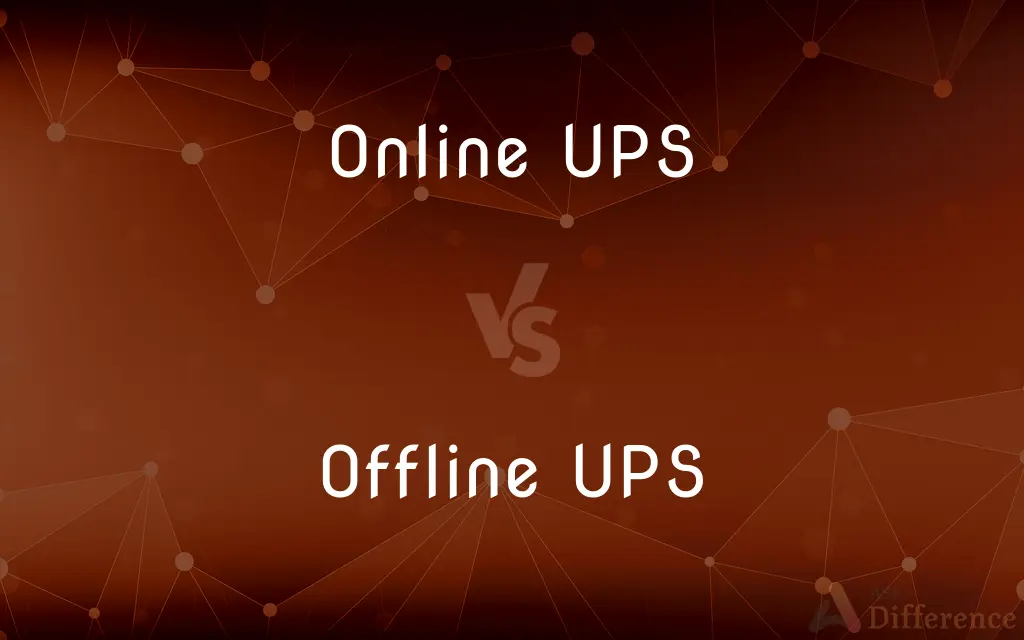Online UPS vs. Offline UPS — What's the Difference?
By Tayyaba Rehman — Published on October 15, 2023
Online UPS provides continuous power supply and instant switch to battery during power failure, whereas Offline UPS allows a delay and relies on the power source until a failure is detected.

Difference Between Online UPS and Offline UPS
Table of Contents
ADVERTISEMENT
Key Differences
Online UPS and Offline UPS represent two different types of Uninterruptible Power Supply systems, designed to provide power backup in case of power failure. Online UPS systems provide constant power support by continually supplying power to the connected devices, whether from the mains or the battery, ensuring that there is no interruption in power supply. This type of UPS is ideal for sensitive equipment as it offers a high level of power protection. Offline UPS, on the other hand, typically stays in standby mode and switches to battery power only when it detects a power failure, which can lead to a brief interruption in power supply.
Online UPS systems generally have a higher cost due to their complex design and continuous power supply feature, making them suitable for environments where power stability is critical, such as data centers and medical facilities. In contrast, Offline UPS systems are more cost-effective and are commonly used in less critical environments like homes and small offices where a short power interruption is acceptable.
While Online UPS provides superior protection against all types of power disturbances, including blackouts, brownouts, and surges, due to its continuous power conditioning, Offline UPS primarily provides protection against blackouts and usually offers less comprehensive power conditioning. This makes Online UPS more reliable in maintaining the quality of power delivered to the connected devices.
Online UPS typically involves higher operational costs as it consumes more power and requires more cooling due to its continuous operation. Conversely, Offline UPS is more energy-efficient and generates less heat as it operates in standby mode most of the time, making it more suitable for environments with limited resources.
Comparison Chart
Operational Mode
Operates continuously, supplying constant power.
Operates in standby mode, activates during power failure.
ADVERTISEMENT
Cost
Generally more expensive due to complexity.
More affordable, simpler design.
Protection Level
Provides superior protection against all power disturbances.
Offers basic protection, mainly against blackouts.
Efficiency
Consumes more power, less energy-efficient.
More energy-efficient, consumes less power.
Application
Suitable for critical environments like data centers.
Ideal for homes and small offices.
Compare with Definitions
Online UPS
Online UPS typically has a higher purchasing cost due to its complex design.
Despite the higher initial investment, businesses often choose Online UPS for critical operations.
Offline UPS
Offline UPS usually has a simpler design and is more cost-effective.
Consumers looking for budget-friendly options usually opt for Offline UPS systems.
Online UPS
Online UPS continuously provides power to connected devices.
The data center utilizes an Online UPS to prevent any power interruptions.
Offline UPS
Offline UPS is more affordable and suitable for less critical applications.
Small offices find Offline UPS to be a cost-effective solution for brief power interruptions.
Online UPS
Online UPS offers high-level power protection suitable for sensitive equipment.
Medical facilities often use Online UPS to ensure the constant operation of life-saving equipment.
Offline UPS
Offline UPS activates and supplies power only during a power failure.
Home computers often use an Offline UPS to counter sudden power outages.
Online UPS
Online UPS involves higher operational costs due to continuous operation.
Companies invest in Online UPS understanding the increased operational expense but valuing uninterrupted power.
Offline UPS
Offline UPS provides basic protection mainly against power blackouts.
For users primarily concerned with power blackouts, an Offline UPS is often sufficient.
Online UPS
Online UPS provides superior protection against various power disturbances.
Many IT infrastructures prefer Online UPS for its ability to safeguard against blackouts, brownouts, and surges.
Offline UPS
Offline UPS operates primarily in standby mode, making it more energy-efficient.
Many users prefer Offline UPS in residential settings due to its lower energy consumption.
Common Curiosities
Is Offline UPS suitable for critical operations?
Offline UPS is usually more suitable for less critical applications due to its basic protection level.
Is Online UPS more expensive?
Generally, Online UPS systems are more expensive due to their complexity and continuous operation.
Does Online UPS provide continuous power supply?
Yes, Online UPS continuously supplies power to the connected devices.
Is Offline UPS more energy-efficient?
Yes, Offline UPS is generally more energy-efficient as it operates in standby mode most of the time.
Does Online UPS require more cooling?
Yes, Online UPS requires more cooling due to its continuous operation.
Which UPS is suitable for data centers?
Online UPS is more suitable for data centers due to its high level of power protection.
Which UPS system offers superior protection against power disturbances?
Online UPS offers superior protection against all types of power disturbances.
Can Offline UPS provide instant switch to battery during power failure?
Offline UPS usually allows a delay during the switch, causing a brief power interruption.
Can Offline UPS be used for home computers?
Yes, Offline UPS is commonly used for home computers where a short power interruption is acceptable.
Is Offline UPS operationally cost-effective?
Yes, Offline UPS is operationally cost-effective due to its energy efficiency and simpler design.
Is Online UPS ideal for sensitive equipment?
Yes, Online UPS is ideal for sensitive equipment due to its high-level power protection.
Can Offline UPS offer protection against all power disturbances?
Offline UPS mainly offers basic protection against blackouts and is usually less comprehensive.
Is Offline UPS more suitable for small offices?
Yes, Offline UPS is ideal for small offices where a short power interruption is acceptable.
Does Online UPS have higher operational costs?
Yes, Online UPS has higher operational costs due to its continuous operation and power consumption.
Does Online UPS operate continuously?
Yes, Online UPS operates continuously, providing constant power to connected devices.
Share Your Discovery

Previous Comparison
Enthalpy vs. Internal Energy
Next Comparison
Pursuit vs. ChaseAuthor Spotlight
Written by
Tayyaba RehmanTayyaba Rehman is a distinguished writer, currently serving as a primary contributor to askdifference.com. As a researcher in semantics and etymology, Tayyaba's passion for the complexity of languages and their distinctions has found a perfect home on the platform. Tayyaba delves into the intricacies of language, distinguishing between commonly confused words and phrases, thereby providing clarity for readers worldwide.














































